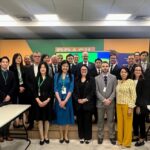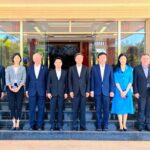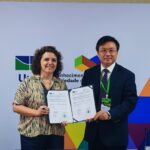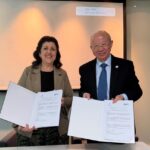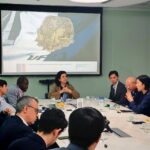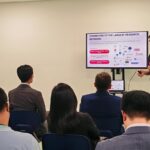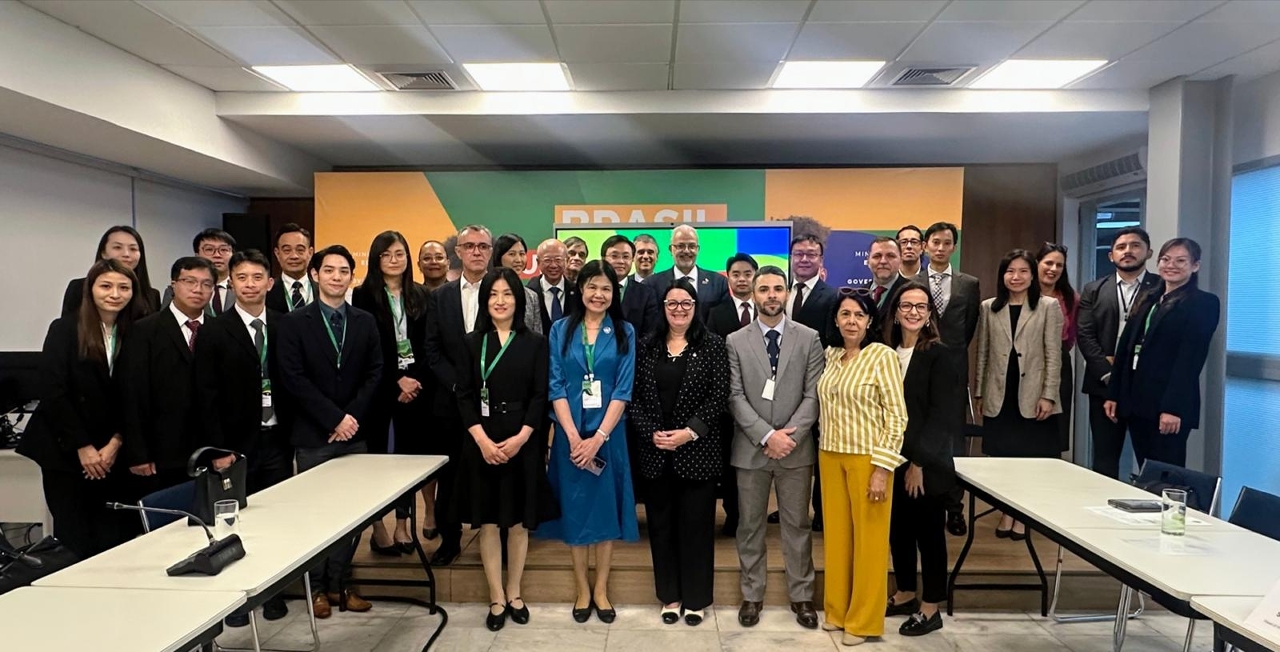 The delegation visits the Ministry of Education of Brazil
The delegation visits the Ministry of Education of Brazil
To advance the integrated development of education, technology and talent, promote the internationalisation of higher education in Macao, and enhance the overall strength of local higher education continuously, a delegation of representatives from local higher education institutions, led by Teng Sio Hong, deputy director of the Education and Youth Development Bureau (DSEDJ), travelled to São Paulo, Brasília and Rio de Janeiro in Brazil from 10 to 15 October (local time in Brazil), where they visited Brazilian universities, a technological innovation park, a technology and innovation centre and other sites, and signed multiple agreements on educational cooperation. The journey yielded fruitful results with a total of eight cooperation agreements signed and intent of cooperation in five initiatives confirmed between Macao higher education institutions and Brazilian universities and organisations, thereby strengthening bilateral partnerships in areas such as academic exchange, faculty and student exchange, as well as scientific research collaboration.
Pushing forward the internationalisation of higher education in Macao continuously
In active response to our country’s Master Plan on Building China into a Leading Country in Education (2024–2035) and to support Macao higher education institutions in deepening international and regional academic exchange and research collaboration, the delegation visited a number of universities in Brazil and exchanged views with Paulo Cesar Montagner, rector of the State University of Campinas; Rozana Reigota Naves, rector of the University of Brasília; Cássia Curan Turci, vice-rector of the Federal University of Rio de Janeiro; and Ricardo Trindade, president of the China Center of the University of São Paulo. The delegates also introduced to the universities the current state of higher education in Macao and discussed with them topics such as university development, talent cultivation, research collaboration and establishment of the Macao–Hengqin International Education (University) Town. During the journey in Brazil, the delegation also paid a visit to the Brasil 247 media group to reinforce international promotion and publicity efforts for Macao’s higher education.
Attracting outstanding and professional international talent to Macao
The delegation also called on the Embassy of the People’s Republic of China in the Federative Republic of Brazil and the Ministry of Education of Brazil, where they respectively presented to Minister-Counsellor Xing Wenju and Deputy Minister of Brazil’s Ministry of Education Marcus Vinicius David the development of higher education in Macao and educational cooperation between the two regions, expressing the hope that the Embassy and the Brazilian Ministry of Education would assist in boosting and continuing to deepen bilateral educational exchange and expanding promotional coverage in Brazil in order to draw more outstanding international talent to Macao, thereby contributing to the adequate economic diversification in Macao and the development of the Guangdong–Macao In-Depth Cooperation Zone in Hengqin. In addition, the group of delegates visited the Commercial Association of Rio de Janeiro and exchanged views with President Josier Vilar on the feasibility of joint training of Sino-Lusophone business and trade talent, while accompanying representatives of the Talent Development Committee toured several Brazil-based institutions such as the China Trade Center and the Federation of Chambers of Foreign Trade, where they outlined the development of Macao’s key industries and the MSAR’s talent recruitment programmes, in a bid to motivate outstanding and professional talent in Brazil to come to Macao and support the city’s adequate economic diversification and sustainable high-quality development.
Linking up local universities with international research and technological innovation platforms
The delegation toured the São José dos Campos Technological Innovation Park (PIT) in São Paulo and Porto Maravalley (POMAR), a technology and innovation centre, in Rio de Janeiro. As a comprehensive connection hub that promotes science, technology, innovation and entrepreneurship, PIT facilitates cross-sector collaboration and technology transfer among higher education institutions, research institutes and enterprises. Focused on pioneering fields such as artificial intelligence, smart cities and cultural and creative industries, POMAR hosts a technology festival annually to showcase the latest achievements and bring about cross-border cooperation. Apart from engaging in in-depth exchanges with representatives of PIT and POMAR on themes such as bolstering sci-tech innovation and linking up research platforms, the delegation confirmed intent of cooperation with the organisations to continuously enhance the transformation of technological achievements and the cultivation of innovative talent in institutions of higher learning, thereby leveraging the roles of higher education institutions and high-level research platforms.
The DSEDJ will continue to intensify and broaden cooperation in scientific research and education with Portuguese-speaking countries, build a brand of higher education for Macao, promote the development of Macao’s higher education institutions in alignment with local key industries and the direction of internationalising higher education, and actively push forward with joint training programmes in partnership with universities in Portuguese-speaking countries, with the goal of expanding Macao’s international circle of friends, strengthening international and regional educational ties, and attracting more outstanding international talent from a variety of places to Macao, thereby building Macao into an important bridgehead for China’s high-standard opening-up and a vital window for exchange and mutual learning between Chinese and Western civilisations.
Members of the delegation also included: Hui King Man, vice-rector of the University of Macau; Im Sio Kei, rector of Macao Polytechnic University; Loi Kim Ieng, vice-rector of the Macao University of Tourism; Lam Io Fan, deputy director of the Academy of Public Security Forces of Macao; Alexandre Lobo, vice-rector of the University of Saint Joseph; Leong Man Wai, associate vice-president of the Macau University of Science and Technology; Ng Wai I, vice-president of the Kiang Wu Nursing College of Macau; José Alves, dean of the Faculty of Business at the City University of Macau; and Carlos Roberto Xavier, head of the Department of Tertiary Education at the DSEDJ.


